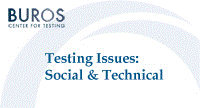Buros-Nebraska Series on Measurement and Testing

Social and Technical Issues in Testing: Implications for Test Construction and Usage
Date of this Version
1984
Document Type
Article
Citation
Published in Social and Technical Issues in Testing: Implications for Test Construction and Usage, edited by Barbara S. Plake (Hillsdale, NJ: Lawrence Erlbaum Associates, 1984).
Abstract
This chapter confronts the question of what role cognitive abilities play or ought to play in educational achievement testing, which raises the prior question of what educational achievement tests are or ought to be. I begin by considering the nature of educational achievement as a construct in an attempt to circumscribe what achievement tests ought to be rather than by examining extant achievement tests that may be variously off target. Similar consideration is accorded cognitive ability as a construct. This distinction between constructs and the imperfect, variously contaminated tests that are purported to measure them is a critical recurrent theme in these deliberations. Other questions to be briefly addressed concern the role of cognitive abilities in the processes of school learning and the role of schooling in the development of cognitive abilities.
STRUCTURES OF KNOWLEDGE AND ABILITY
Educational achievement refers to what an individual knows and can do in a specified subject area. At issue is not merely the amount of knowledge accumulated but its organization or structure as a functional system for productive thinking , problem solving , and creative invention in the subject area as well as for further learning. The individual’s structure of knowledge is a critical aspect of educational achievement because it facilitates or hinders what he or she can do in the subject area. What a person can do in an area includes a variety of area specific skills, such as extracting a square root or parsing a sentence or balancing a chemical equation , but also broader cognitive abilities that cut across subject areas, such as comprehension, memory retention and retrieval, reasoning, analysis and restructuring, evaluation or judgment, and fluency.
These broader cognitive abilities contribute to the assembly and structuring of knowledge, to the continual reassembly and restructuring of cumulating knowledge, to the accessing and retrieval of knowledge, and to its use in problem representation and solution. "Thus achievement," in Snow's (1980a) words, “is as much an organization function as it is an acquisition function. And new achievement depends as much on transfer of such organization as it does on transfer of specific prior facts and skills [p. 43]. “Because cognitive abilities play a central role in both the acquisition and organization functions of educational achievement, their influence can hardly be suppressed or ignored in educational achievement testing that assesses knowledge structures. However, their role may be reduced in low-level achievement testing that stresses amount of information alone. Let us next consider the nature of developed knowledge structures in more detail and then the nature of developed abilities, before attempting to relate this formulation to other conceptions of educational achievement.


Comments
Copyright © 1984 by Lawrence Erlbaum Associates. Digital edition copyright © 2012 Buros Center for Testing. This book may be downloaded, saved, and printed by an individual for their own use. No part of this book may be re-published, re-posted, or redistributed without written permission of the holder of copyright.